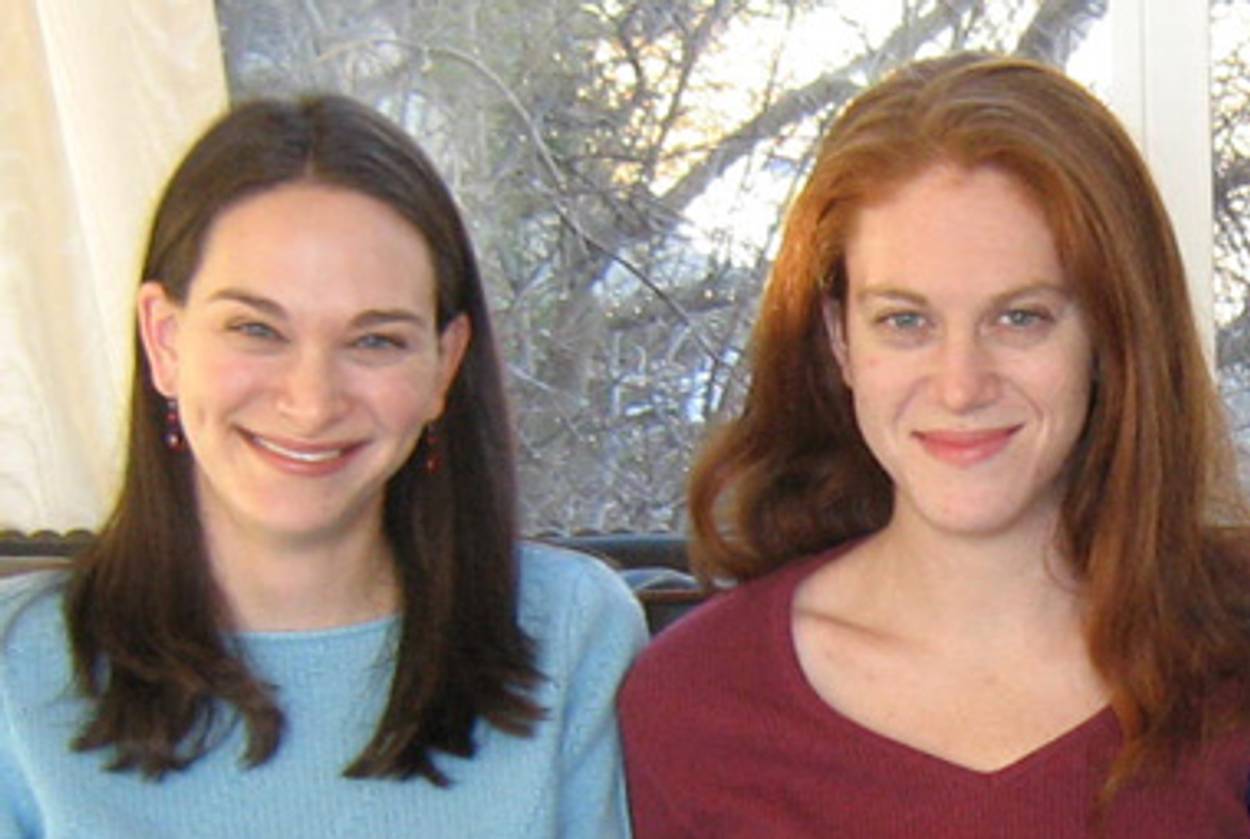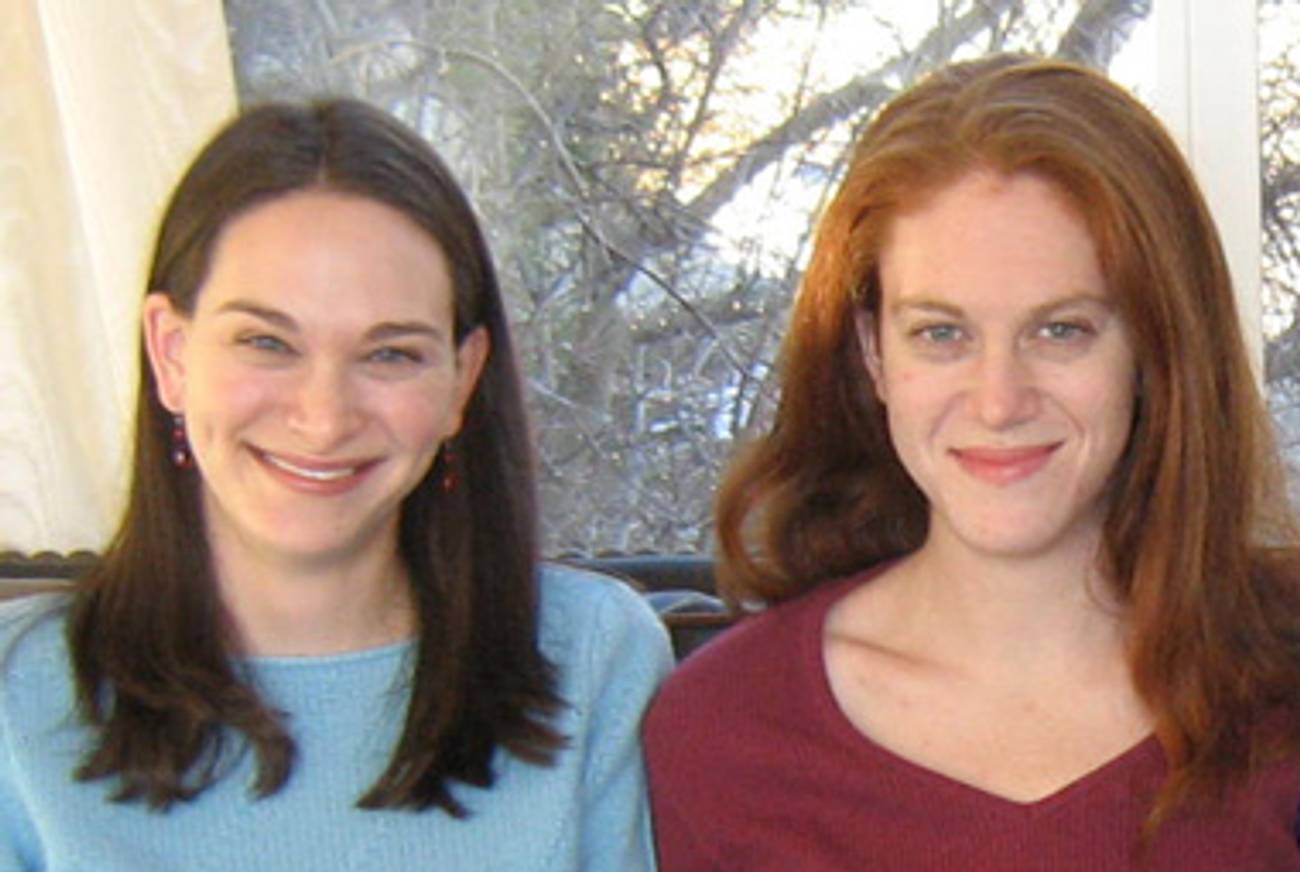Sister Acts
A pair of twins navigate geographic and political divides




It was a long week for Bekah Wolf: the day before her husband, a Palestinian activist, was released from a 15-month stint in Israeli prison, Bekah herself landed in jail for a day following a confrontation with soldiers from the Israel Defense Forces. So she called her twin sister, the rabbi.
At first glance, Sarah and Bekah Wolf don’t even look all that much like sisters, let alone twins. Sarah is of medium height, with dark brown hair and pale blue eyes; Bekah has the same eyes, but she’s six feet tall with red hair and freckles. Not that they’re together that much these days, anyhow: Sarah lives outside Palo Alto, California, where she’s the assistant rabbi at Congregation Beth Am, a Reform synagogue, and Bekah helps run the Palestine Solidarity Project, an anti-occupation organization in the West Bank.
But hearing them speak puts to rest any doubts about their kinship. As befits the children of two lawyers, they’re casually hyper-articulate; and, more surprisingly given their different vocations, they have many of the same thing to say. Thirty years ago, their titles would have signified that these two young women had taken radically different ideological paths. That they see themselves as like-minded is evidence of the changed landscape of American Jewish life.
Sarah and Bekah grew up in Santa Fe’s liberal Jewish community. Their father, Aaron, spent his youth protesting the Vietnam War; he now spends his free time as his synagogue’s part-time musical director. Their mother, Carolyn, who was raised Southern Baptist in Albuquerque converted to Judaism when the twins were approaching their bat mitzvahs. (They’re 28 now.) They supplemented their public school education with attendance at Jewish and Baptist religious schools, though they quit the latter after fifth grade.
Aaron describes his daughters as having been “somewhat locked in twin mode” in their youth, “not the kind of twin mode where they would dress alike and do stuff together,” but in the sense that they developed their identities in opposition to each other. Bekah “was more forceful and aggressive and she had more issues with authority,” Aaron said in a description echoed by the rest of the family. “Sarah was more obliging and considerate and maybe too timid.”
“I was the one who got thrown out of classes and she was the valedictorian,” Bekah said of their high school experience. At that time, both girls were involved in the Reform movement’s youth group, North American Federation of Temple Youth (commonly known as NFTY), and worked at their synagogue, Temple Beth Shalom, while in high school. The synagogue was on the liberal end of the Reform movement: gay-friendly, open to interfaith families, and, Sarah recalled, not “a big Zionist congregation.” Nevertheless, the twins spent the summer between their junior and senior years on a NFTY trip to Israel.
“I remember feeling a little disillusioned and feeling like everyone else was really gung-ho,” said Sarah, who recalled being put off by students on the trip who were strongly opposed to intermarriage and to relinquishing land in the occupied territories. Bekah loved it. “I came back being like, we have this cool, great, country, there are these tough, great Jews,” she said.
For college, Bekah headed to New York University and Sarah to Amherst in Massachusetts. Bekah quickly became a campus activist, but “I wouldn’t touch the Israel-Palestine situation even though I had friends who were Palestine activists,” she explained. “I would fight with them and say, ‘I’m a Jew and you’re wrong.’” But in 2001, at the beginning of her junior year, terrorists attacked the World Trade Center and the mood on campus turned dark. According to Bekah, some Jewish students began harassing Arab ones. Angered by the situation, she joined a campus group called Jews Against the Occupation, her first foray into Palestine activism.
That same year, Sarah, who had started college with the intention of becoming a doctor, was busy deciding that what she really wanted to be was a rabbi. Temple Beth Shalom had stuck in her mind as the kind of religious community she wanted to recreate, and she was drawn to the pastoral and educational aspects of the job as well as the “God-centered side” of Judaism which, she said, she thinks her mother’s upbringing as a Baptist may have drawn her towards. Her senior year at Amherst, she was accepted to rabbinical school at Hebrew Union College, the Reform movement’s seminary.
HUC students spend their first year in Jerusalem, and Sarah headed there excited but wary—it was fall of 2003, a violent season early in the Second Intifada, and she was nervous about the violence. In the end, though, that turned out to be only one challenge among many.
“There were several bus bombings close to my house and my school,” Sarah said. “But I think even more than that, the rhetoric at my school was very ‘Israel right or wrong.’ And I didn’t feel the same connection to Israelis. It was a painful, painful year.” As on her earlier trip to Israel, some of her fellow students looked down on interfaith families like her own; it was also the year that Israel’s separation barrier started going up, and a trip with a leftist Israeli activist group to see its construction left her horrified.
And then, in December, Bekah came to visit. “I like to think it was sibling rivalry,” Sarah said. “Everyone was worried about me being in Israel so she had to go somewhere even more dangerous.” That place was the West Bank, where Bekah spent several weeks, and then, after a short trip home, another two months, working with the International Solidarity Movement in the West Bank. For the second time, they were in Israel together.
“We were just experiencing two different sides of an insane situation,” Bekah said. “I would come visit her in Jerusalem and stay for a couple days, and then I couldn’t deal with being inside Israel. I’d see soldiers walking the street and see the people who had shot at me last week.”
Both sisters say that they were too caught up in their own experiences to be particularly empathetic with the other, though Bekah seems to remember most vividly situations in which she felt politically alienated, while some of Sarah’s recollections were more earthbound.
“We were not fighting over the issues as much,” Sarah said. “We had tension because she would come and eat all the food in my house.”
On one memorable occasion, Bekah told me, she went to school with Sarah and sat in on her classes. “She had told everyone [about me], I think she thought it made her a good dinner topic,” Bekah said. “It was pretty much a freak show—I was the freak.” (When I asked Sarah about this, she laughed in recognition. “I do make a little bit of fun of her,” she said. “She gets pissed off sometimes. Tough crap! I’m not going to lie when people ask me what she’s doing.”)
Another time, Aaron and Carolyn came to visit; it was Passover, and the family seder included Sarah’s HUC friends, some of whom were politically conservative, and Bekah’s guest, a British, non-Jewish Palestine activist. Sarah said she spent the seder in fear that Bekah would pass around her new prized possession, a photo of herself with Yasser Arafat. (Bekah refrained.)
“I think now we can bond over the insanity of everything,” Bekah said. “I mean, certainly we can bond over our dislike of Israeli society—not even about politics, but about being in a foreign country that’s not as much like America as we would have liked.”
Sarah returned to the U.S. “very disillusioned with Israel but not with my choice to become a rabbi,” she said. Unlike many young rabbis, she hasn’t been back to Israel since her requisite year there; just like in high school, in her rabbinical world she sometimes feels like the least “gung-ho” person in the room. Sometimes it helps to bring up Bekah, she said; it gives her a chance to point out to people who assume that as a rabbi she must be a staunch Zionist that, in fact, she and her Palestine activist sister actually aren’t so ideologically different. Now, she said, she feels ready to go back. She might get her chance this summer, when Bekah—who now calls her “my rabbi”—and her husband have their wedding party.
Bekah, despite her intense frustrations with life in the West Bank, found herself still addicted to the adrenaline of the war-torn region that she had loved on the NFTY trip. She tried to return to the West Bank in 2005, but Israel deported her back to the United States. In the summer of 2006, she made the trip successfully, and met an organizer named Moussah Abu Maria at a protest in the village of Beit Ommar. Later that year, they became romantically involved, and the two of them, together with a few friends, started their own organization, the Palestine Solidarity Project.
Last April, Abu Maria was arrested by Israeli authorities; according to Sarah and Bekah, he was never officially charged with a crime, but was held in administrative detention for 15 months. In order for Bekah to be allowed to visit him in prison, the two filled out the paperwork that officially married them under Palestinian law. Among the Wolfs, Sarah alone seems to have digested the fact that her sister is married (Sarah herself is single); in separate conversations, Aaron referred to Abu Maria as Bekah’s “friend,” and Carolyn explained that her daughter is “involved with this Palestinian man.” Though both parents were emphatic that they don’t object to their daughter marrying a Palestinian (“Aaron married a non-Jew,” Carolyn pointed out), they are unenthusiastic about her setting up a life with someone they have never met in a dangerous part of the world thousands of miles away.
Now that Abu Maria is free, he and Bekah want to have a wedding reception, “one with Palestinians and Israelis and internationals where everyone comes, instead of a traditional Palestinian wedding where women and men are separate,” Bekah said. Sarah says she’ll go if she can (“like, if they actually tell me ahead of time”), Aaron hasn’t made up his mind, and Carolyn is dubious about traveling to the West Bank but hasn’t ruled out the possibility. There may be a Wolf family reunion in Beit Ommar, after all.
Marissa Brostoff, a doctoral student in English at the CUNY Graduate Center, is a former staff writer at Tablet and the Forward.
Ari M. Brostoff is Culture Editor at Jewish Currents.